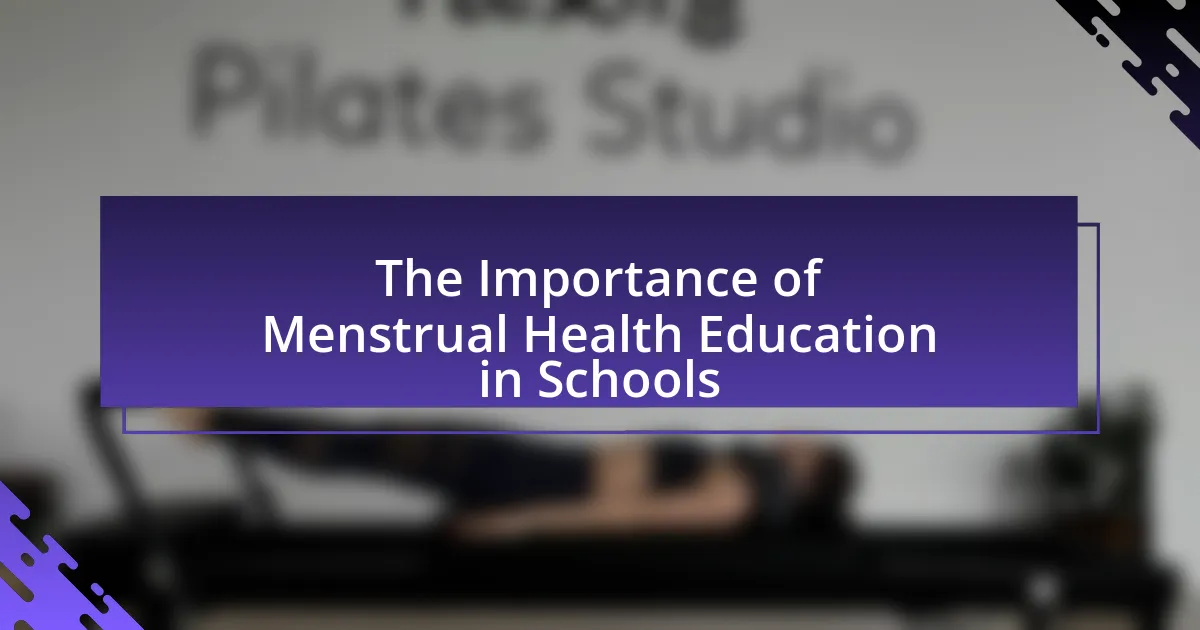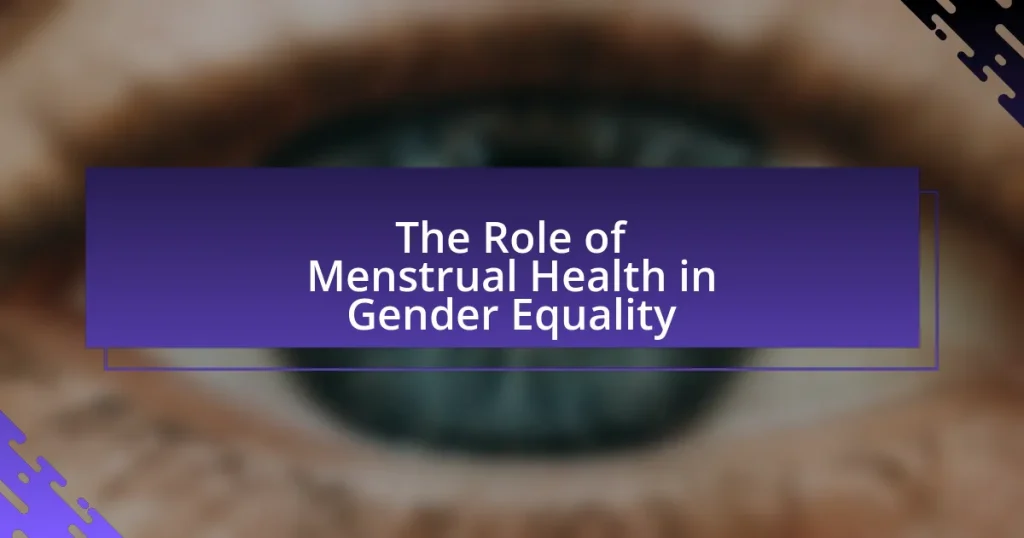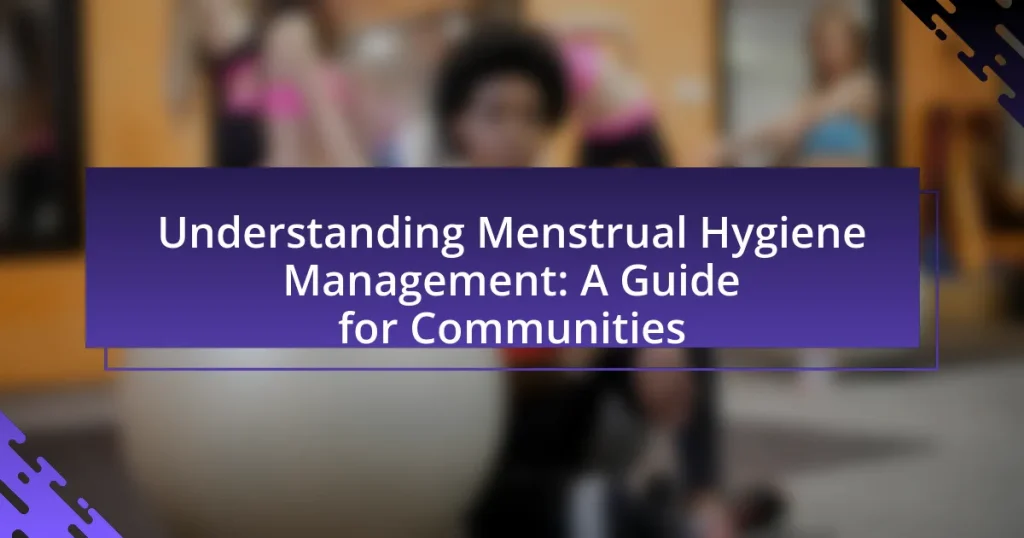Menstrual health education in schools is essential for promoting awareness and understanding of menstruation among students. This education helps dispel myths and stigma, leading to improved academic performance and overall well-being. Key components include understanding the menstrual cycle, hygiene management, and addressing misconceptions. Research indicates that comprehensive menstrual health education can enhance students’ confidence, reduce anxiety, and improve attendance, ultimately fostering a supportive environment for discussions about reproductive health. Additionally, cultural beliefs and societal norms significantly influence perceptions of menstruation, highlighting the need for effective educational strategies to overcome barriers and empower students.
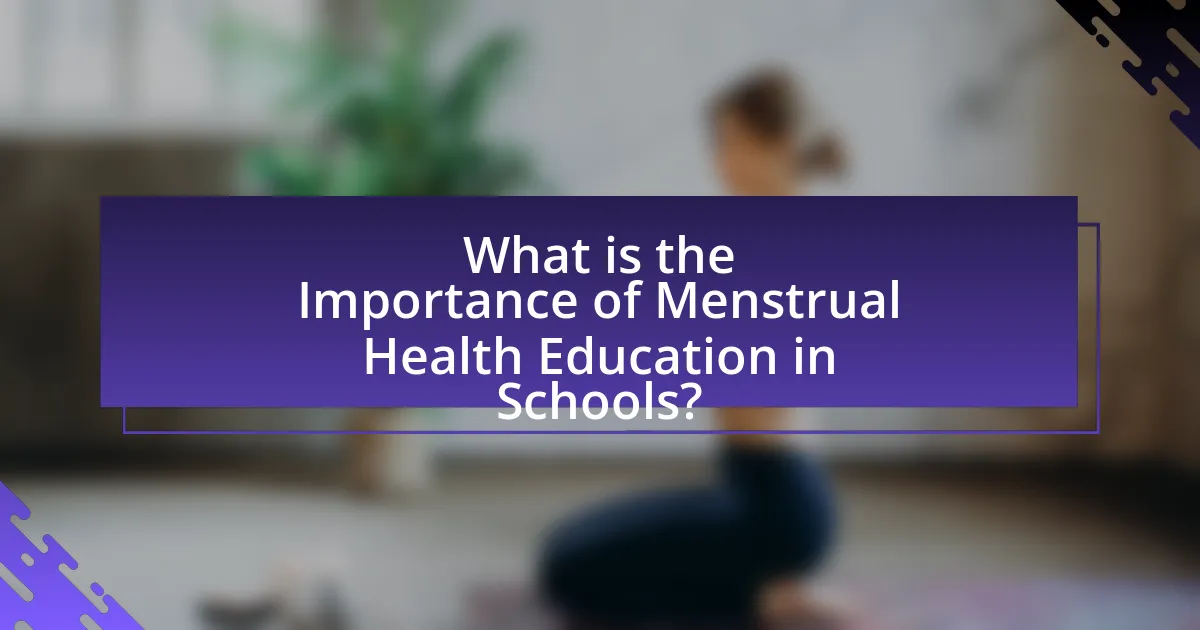
What is the Importance of Menstrual Health Education in Schools?
Menstrual health education in schools is crucial for fostering awareness and understanding of menstrual health among students. This education helps to dispel myths and stigma surrounding menstruation, promoting a healthier attitude towards this natural biological process. Research indicates that comprehensive menstrual health education can lead to improved academic performance, as students who are informed about menstrual health are less likely to miss school due to menstruation-related issues. For instance, a study published in the journal “BMC Women’s Health” found that girls who received menstrual health education reported higher levels of confidence and lower levels of anxiety related to menstruation. Thus, implementing menstrual health education in schools is essential for empowering students and ensuring their well-being.
Why is menstrual health education crucial for students?
Menstrual health education is crucial for students because it empowers them with knowledge about their bodies, promotes hygiene, and reduces stigma associated with menstruation. Understanding menstrual health enables students to manage their menstrual cycles effectively, which is essential for their physical and emotional well-being. Research indicates that comprehensive menstrual education can lead to improved academic performance, as students who are informed are less likely to miss school due to menstrual-related issues. Additionally, studies show that when students receive proper education on this topic, they are more likely to engage in healthy practices and seek medical help when necessary, ultimately fostering a supportive environment that normalizes discussions around menstruation.
What are the key components of menstrual health education?
The key components of menstrual health education include understanding the menstrual cycle, hygiene management, addressing myths and misconceptions, and promoting emotional well-being. Understanding the menstrual cycle involves educating individuals about the biological processes, including hormonal changes and the average duration of menstruation. Hygiene management focuses on the proper use of menstrual products, such as pads and tampons, and emphasizes the importance of maintaining cleanliness to prevent infections. Addressing myths and misconceptions helps to dispel stigma and misinformation surrounding menstruation, fostering a supportive environment. Promoting emotional well-being involves discussing the psychological aspects of menstruation, including premenstrual syndrome (PMS) and the emotional changes that may occur. These components collectively contribute to comprehensive menstrual health education, which is essential for empowering individuals and promoting overall health.
How does menstrual health education impact students’ well-being?
Menstrual health education significantly enhances students’ well-being by promoting knowledge, reducing stigma, and improving health outcomes. Research indicates that when students receive comprehensive menstrual health education, they experience increased confidence and reduced anxiety related to menstruation. A study published in the Journal of Adolescent Health found that girls who received menstrual health education reported higher levels of self-esteem and better management of menstrual symptoms. Furthermore, effective education can lead to improved attendance in school during menstruation, as students feel more prepared and supported. This education also fosters a more open dialogue about reproductive health, contributing to a healthier school environment overall.
What misconceptions exist about menstrual health education?
Misconceptions about menstrual health education include the belief that menstruation is a taboo subject, that it is solely a female issue, and that comprehensive education is unnecessary. Many people think discussing menstruation is inappropriate, leading to silence and stigma, which can hinder understanding and support. Additionally, some believe that only females need to be educated about menstruation, ignoring the importance of involving all genders in the conversation to foster empathy and reduce stigma. Furthermore, there is a misconception that basic information suffices, while research indicates that comprehensive menstrual health education can significantly improve knowledge, attitudes, and practices related to menstrual hygiene and health. For instance, a study published in the Journal of Adolescent Health found that effective menstrual health education can lead to better health outcomes and increased school attendance among menstruating individuals.
How do cultural beliefs influence perceptions of menstruation?
Cultural beliefs significantly influence perceptions of menstruation by shaping attitudes, practices, and stigma surrounding it. For instance, in many cultures, menstruation is viewed as a taboo subject, leading to silence and misinformation, which can hinder menstrual health education. Research indicates that in some societies, menstruating individuals may be considered impure or restricted from participating in daily activities, reinforcing negative perceptions and feelings of shame. A study published in the journal “Reproductive Health” by Hennegan et al. (2019) highlights that cultural norms can dictate the level of support and resources available for menstrual health, impacting overall well-being and educational opportunities for menstruators.
What are the common myths surrounding menstruation?
Common myths surrounding menstruation include the beliefs that menstruating individuals cannot participate in sports, that menstruation is dirty or impure, and that it can be suppressed indefinitely without health consequences. These misconceptions can lead to stigma and misinformation. For instance, the idea that menstruating individuals should avoid physical activity is unfounded; research shows that exercise can alleviate menstrual symptoms. Additionally, the notion of menstruation being unclean is rooted in cultural taboos rather than biological facts, as menstruation is a natural bodily function. Lastly, while hormonal contraceptives can regulate or suppress menstruation, long-term suppression without medical guidance can lead to health issues, emphasizing the need for accurate education on menstrual health.
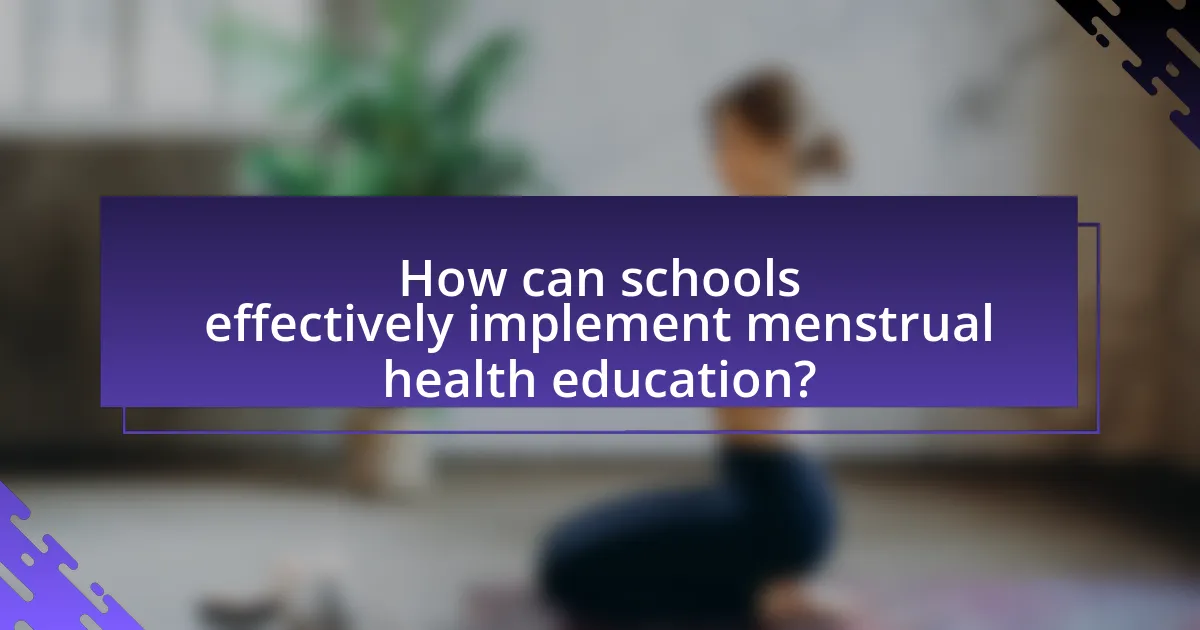
How can schools effectively implement menstrual health education?
Schools can effectively implement menstrual health education by integrating it into the existing health curriculum and providing comprehensive training for educators. This approach ensures that students receive accurate information about menstruation, hygiene, and related health issues in a supportive environment. Research indicates that comprehensive menstrual health education can lead to improved knowledge and attitudes towards menstruation among students, as evidenced by a study published in the Journal of Adolescent Health, which found that schools that included menstrual health education saw a 30% increase in students’ understanding of menstrual hygiene practices. Additionally, involving parents and the community in educational initiatives can further reinforce the importance of menstrual health, creating a more informed and supportive atmosphere for students.
What strategies can educators use to teach menstrual health?
Educators can use interactive workshops, comprehensive curricula, and open discussions to teach menstrual health effectively. Interactive workshops engage students through hands-on activities, allowing them to explore menstrual products and understand the biological processes involved. Comprehensive curricula that include scientific, emotional, and social aspects of menstruation provide a well-rounded education, addressing myths and stigma. Open discussions create a safe environment for students to ask questions and share experiences, fostering a supportive community. Research indicates that schools implementing such strategies see improved knowledge and attitudes towards menstrual health, leading to better health outcomes for students.
How can schools create a supportive environment for discussions on menstruation?
Schools can create a supportive environment for discussions on menstruation by implementing comprehensive menstrual health education programs. These programs should include age-appropriate curriculum that addresses the biological, emotional, and social aspects of menstruation, fostering an open dialogue among students. Research indicates that when schools provide accurate information and promote a culture of acceptance, students feel more comfortable discussing menstruation, which can reduce stigma and anxiety associated with it. For instance, a study published in the Journal of Adolescent Health found that comprehensive menstrual education significantly improved students’ knowledge and attitudes towards menstruation, leading to increased confidence in discussing the topic. Additionally, schools can facilitate workshops, provide resources like menstrual products, and train staff to support students, further enhancing the supportive environment for these discussions.
What resources are available for educators to enhance menstrual health education?
Educators can enhance menstrual health education through various resources, including comprehensive curricula, online training modules, and community partnerships. Comprehensive curricula, such as those developed by the World Health Organization, provide structured content that covers biological, emotional, and social aspects of menstruation. Online training modules, like those offered by the Menstrual Health Hub, equip educators with the necessary knowledge and teaching strategies. Additionally, partnerships with local health organizations can provide access to workshops and materials that promote accurate information and support for students. These resources collectively contribute to a well-rounded approach to menstrual health education in schools.
How can parents and communities support menstrual health education in schools?
Parents and communities can support menstrual health education in schools by advocating for comprehensive curricula that include accurate information about menstruation and reproductive health. Engaging in discussions with school administrators and teachers can help ensure that menstrual health topics are included in health education programs. Research indicates that when parents are involved in educational advocacy, schools are more likely to implement effective health education initiatives, leading to improved student knowledge and comfort regarding menstrual health. Additionally, community organizations can provide resources, workshops, and training for educators to enhance their understanding and teaching of menstrual health, further reinforcing the importance of this education in schools.
What role do parents play in reinforcing menstrual health education?
Parents play a crucial role in reinforcing menstrual health education by providing accurate information and fostering open communication about menstruation. Their involvement helps to normalize discussions around menstrual health, which can reduce stigma and anxiety for young individuals. Research indicates that when parents engage in conversations about menstruation, children are more likely to feel comfortable seeking information and support, leading to better understanding and management of menstrual health. For instance, a study published in the Journal of Adolescent Health found that parental support significantly influences adolescents’ knowledge and attitudes towards menstruation, highlighting the importance of parental engagement in this educational aspect.
How can community organizations contribute to menstrual health awareness?
Community organizations can significantly contribute to menstrual health awareness by providing educational programs and resources that promote understanding of menstrual health. These organizations often conduct workshops, distribute informational materials, and facilitate discussions that address myths and stigmas surrounding menstruation. For instance, a study by the World Health Organization indicates that comprehensive menstrual health education can improve knowledge and attitudes, leading to better health outcomes for individuals. By engaging with schools and communities, these organizations help to create a supportive environment that encourages open dialogue about menstrual health, ultimately fostering a culture of awareness and acceptance.

What are the long-term benefits of menstrual health education in schools?
Long-term benefits of menstrual health education in schools include improved menstrual hygiene management, increased awareness of reproductive health, and reduced stigma surrounding menstruation. Educating students about menstrual health fosters a supportive environment, leading to better health outcomes and academic performance. Research indicates that comprehensive menstrual health education can decrease absenteeism among menstruating students by up to 20%, as students feel more empowered to manage their periods effectively. Furthermore, studies show that such education contributes to greater gender equality, as it equips young people with knowledge that can challenge societal taboos and promote open discussions about reproductive health.
How does menstrual health education affect academic performance?
Menstrual health education positively affects academic performance by reducing absenteeism and enhancing students’ confidence and engagement in school. Research indicates that when students receive comprehensive menstrual health education, they are better equipped to manage their menstrual cycles, leading to fewer missed school days. A study published in the Journal of Adolescent Health found that girls who received menstrual health education reported a 20% decrease in school absenteeism related to menstruation. Additionally, this education fosters a supportive environment, allowing students to participate more actively in class, which correlates with improved academic outcomes.
What evidence supports the link between menstrual health education and improved attendance?
Menstrual health education is linked to improved attendance in schools, as evidenced by studies showing that comprehensive education reduces stigma and absenteeism related to menstruation. For instance, a study published in the journal “BMC Public Health” by Hennegan et al. (2019) found that girls who received menstrual health education were 20% less likely to miss school during their menstrual periods compared to those who did not receive such education. This reduction in absenteeism is attributed to increased knowledge about menstrual hygiene management and the normalization of menstruation, which empowers students to attend school without fear or embarrassment.
How can menstrual health education empower students in their future?
Menstrual health education empowers students by providing them with essential knowledge and skills to manage their menstrual health effectively, which can lead to improved academic performance and overall well-being. Research indicates that when students are educated about menstrual health, they experience reduced stigma and anxiety related to menstruation, enabling them to participate fully in school activities without interruption. For instance, a study published in the Journal of Adolescent Health found that comprehensive menstrual health education significantly increased students’ confidence in managing their periods, which correlates with higher attendance rates during menstruation. This empowerment fosters a sense of agency, allowing students to make informed decisions about their health and well-being, ultimately contributing to their future success in both personal and professional realms.
What challenges do schools face in providing menstrual health education?
Schools face several challenges in providing menstrual health education, primarily due to cultural stigma, lack of trained educators, and insufficient resources. Cultural stigma surrounding menstruation often leads to silence and misinformation, making it difficult for schools to create an open dialogue about the topic. Additionally, many educators lack the necessary training to effectively teach menstrual health, resulting in inadequate or inaccurate information being conveyed to students. Furthermore, schools frequently encounter resource limitations, such as a lack of educational materials and funding, which hinders the implementation of comprehensive menstrual health programs. These challenges collectively impede the ability of schools to deliver effective menstrual health education, ultimately affecting students’ understanding and management of their menstrual health.
How can schools overcome stigma associated with menstruation?
Schools can overcome the stigma associated with menstruation by implementing comprehensive menstrual health education programs. These programs should include accurate information about menstruation, its biological processes, and the importance of menstrual hygiene management. Research indicates that when schools provide education on menstruation, it can significantly reduce stigma and promote a supportive environment; for instance, a study published in the Journal of Adolescent Health found that menstrual education led to increased knowledge and reduced embarrassment among students. Additionally, schools can create open dialogues through workshops and discussions that involve both students and parents, fostering a culture of acceptance and understanding. By normalizing conversations around menstruation, schools can dismantle the stigma and empower students to feel comfortable discussing their experiences.
What are the barriers to implementing comprehensive menstrual health programs?
Barriers to implementing comprehensive menstrual health programs include cultural stigma, lack of funding, insufficient training for educators, and inadequate resources. Cultural stigma surrounding menstruation often leads to silence and misinformation, hindering open discussions and education. Lack of funding restricts the development and sustainability of programs, as schools may not prioritize menstrual health without financial support. Insufficient training for educators results in a lack of confidence and knowledge to teach menstrual health effectively. Additionally, inadequate resources, such as access to menstrual products and educational materials, further complicate the implementation of these programs. These factors collectively impede the establishment of effective menstrual health education in schools.
What practical steps can schools take to enhance menstrual health education?
Schools can enhance menstrual health education by implementing comprehensive curricula that include accurate information about menstruation, reproductive health, and hygiene management. This can be achieved through age-appropriate lessons that address biological, emotional, and social aspects of menstruation, ensuring that students understand the physiological processes and the importance of menstrual hygiene.
Additionally, schools should provide training for teachers to deliver this education effectively, fostering a supportive environment where students feel comfortable discussing menstrual health. Incorporating interactive activities, such as workshops or peer-led discussions, can further engage students and normalize conversations around menstruation.
Furthermore, schools can distribute educational materials, such as pamphlets or digital resources, that students can access privately. Providing menstrual products in school restrooms can also help alleviate stigma and ensure that students have the necessary supplies to manage their periods effectively.
Research indicates that comprehensive menstrual health education can lead to improved knowledge and attitudes towards menstruation, as evidenced by a study published in the Journal of Adolescent Health, which found that students who received such education reported higher levels of comfort discussing menstrual health topics.
